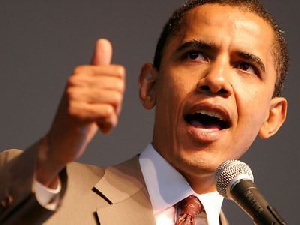Since the day I arrived as a Peace Corps volunteer in Apimsu, a tiny farming village in Ghana, West Africa, it has become my daily habit to greet local friends and neighbors. Immersed in Ghanaian culture for more than two years, I've learned the importance of greeting. One of the most common phrases in my village now seems particularly ironic.
Although English is the national language here, there are more than 50 dialects spoken throughout Ghana, a country the size of Oregon. Speaking Krobo, the language of my village, it is customary to address someone who is leaving. They may be going "to farm," to the market to sell food, or traveling to Accra, the capital city, but the words are always the same: O-Ba-Ma. Literally translated, it means "come in time."
Since my arrival, I've been saying O-Ba-Ma regularly. Have I inadvertently been campaigning all this time? As I make my rounds to greet, many villagers want to brief me on U.S. politics. My neighbor, Kwabena Nomo, listens daily to international news on Ghana's FM radio stations. He travels to our local market town every week to buy the Daily Graphic and catch up on the latest U.S. election information. I also pass along my copies of Newsweek, which he reads cover to cover. Another friend, Zibo, listens every day to the BBC in his familiar language of Hausa and is quick to inform me on any progress in the U.S. presidential race.
This interest in U.S. politics, however, is not just a village phenomenon. On a recent trip to Accra, I noticed street vendors hawking a book about Barack Obama, clearly published and marketed for the Ghanaian audience.
But it's not just international politics that concerns Ghanaians. In 2007 they celebrated 50 years of independence. Their own presidential election will be held in December, and I can feel the political vibe in the air. New election posters have popped up in every city, town and village, while old banners from their previous election in '04 still remain standing. Political parties campaign in cars painted with their logos. They wind through crowded urban areas and down unpaved village roads using loudspeakers to get their message out. Colorful fabrics, a market staple in Ghana, are imprinted with images of political emblems and presidential candidates. They're sold everywhere by the yard and sewn into scarves and clothing.
Recruiting new voters became a nationwide campaign in Ghana this summer. Signs proudly displaying the voter registration card are posted everywhere. While my friends back in the U.S. are volunteering to register voters on university campuses, at street fairs and farmers markets, my friends here in Apimsu have their own method. They pile into local government cars and travel to even more remote villages seeking new voters, particularly those who have turned 18 since the last election.
Last week the local government brought the official voter registration cards to the village, and many of my friends came to me proudly showing theirs off. Like so many other times in my service here, the humble villagers of Ghana have taught me an important lesson. They express such genuine pride and excitement for something I've always taken for granted -- the opportunity to vote in a democracy.
I am approaching the end of my Peace Corps service, and in another twist of irony, I will be leaving Apimsu just before Election Day in the U.S. Saying good-bye to my Ghanaian friends will not be easy but I will try to smile when they shake my hand and say O-Ba-Ma.
Casey Rogers is a Peace Corps volunteer in Ghana, West Africa.
General News of Friday, 3 October 2008
Source: By CASEY ROGERS

















